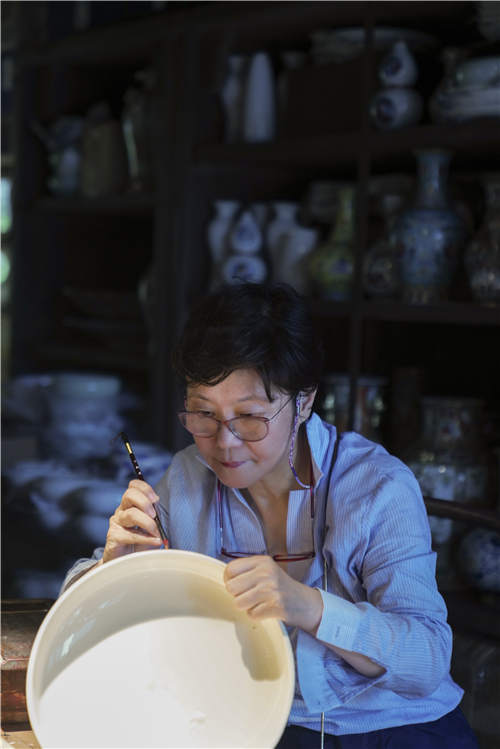

Finding their voices
Of all the eight tales, director Li Shaohong's Her Legend is hailed as the closest to a feature-length film. The story exemplifies an extreme case of gender bias that once prevailed in a heavily patriarchal society: Many craftsmen kept their techniques a secret, and only divulged them to male offspring.
Starring veteran actress Xi Meijuan as the only heir to a prestigious porcelain-glazing family in South China's Guangdong province, the legendary tale looks back on the life of the sexagenarian craftswoman, who recites her soliloquy in the late 1980s. She was raised as a boy and was regarded as a "man" in society. She develops a crush on a young apprentice, but is forced to marry another woman who has her own reasons for playing along with the charade.
Speaking of how both ancient and near-modern China unfairly viewed women's status as inferior to men, Li says she wanted to examine their suffering through a typical tale that some of the audience "may have heard from their grandparents".
A renowned director known for female-driven movies and TV dramas like Blush (1995) and Palace of Desire (1998), Li was shooting the TV drama Unbending Will, about China's poverty alleviation effort, in East China's Fujian province, when she received the call from producer-director Zhao.
Describing the script sent by Zhao as an "engrossing and challenging task", Li believes a monologue can create a more convincing effect. "It enables the audience to feel that the character is confiding in them, speaking about her innermost secrets in private, which makes the scene more touching and impressive," she adds.
With meticulous preparation, Li discussed details of the script with actress Xi, purchasing more than 2,000 porcelain items to decorate the set representing a glazing studio and inviting a master craftsman to teach Xi glazing skills.
Color is used as a pivotal element to offer clues about the life of the character. Juxtaposed against the bright and splendid colors of the porcelain plates painted with vivid flowers or birds, the narrow corner where Xi's character sits to recall her miserable tale has a much bleaker palette.
Explaining the metaphorical use of color Li says the contrast in the environment is like the character's life.
"She has dedicated the most colorful part of her life to maintain the family reputation, but isolated her own yearning to live like a real woman in the darkness," says Li.
Despite the story being set half a century ago, when the protagonist performing the monologue is already in her 60s, director Li says the tale has an enlightening meaning for the modern audience.
"Societal norms have attached many labels to women, requiring them to be good wives or well-behaved daughters-even today. These cliches have limited women's perceptions of their own preferences and pursuits. Women need to hear their own voices from their hearts," says Li.
The show is now available on the Tencent streaming platform, and is scheduled to appear on the BBC's Asian digital platforms in March, according to producer Jin.